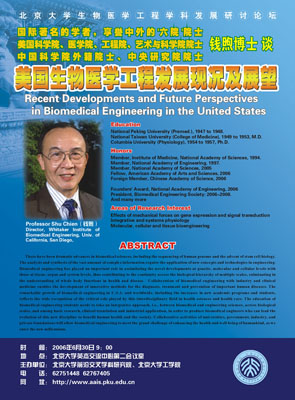题目:美囯生物医学工程发展现况及展望
Recent Developments and Future Perspectives in Biomedical Engineering in the United States
主讲人:国际著名学者,“六院”院士(美国科学院、医学院、工程院、艺术与科学院院士、中国科学院外籍院士、中央研究院院士)钱煦 博士
时间:2006年6月30日9:00
地点:88858cc永利官网英杰交流中心第二会议室
主办单位:88858cc永利官网前沿交叉学科研究院
88858cc永利官网

Professor Shu Chien
Director, Whitaker Institute of Biomedical Engineering, Univ. of California, San Diego
Education
National Peking University (Premed.), 1947 to 1948.
National Taiwan University (College of Medicine), 1949 to 1953, M.D.
Columbia University (Physiology), 1954 to 1957, Ph.D.
Honors
Member, Institute of Medicine, National Academy of Sciences, 1994.
Member, National Academy of Engineering, 1997.
Member, National Academy of Sciences, 2005
Fellow, American Academy of Arts and Sciences, 2006
Foreign Member, Chinese Academy of Science, 2006Founders’ Award, National Academy of Engineering, 2006
President, Biomedical Engineering Society: 2006-2008.
And many more
Areas of Research Interest
Effects of mechanical forces on gene expression and signal transduction
Integrative and systems physiology
Molecular, cellular and tissue bioengineering
ABSTRACT
There have been dramatic advances in biomedical sciences, including the sequencing of human genome and the advent of stem cell biology. The analysis and synthesis of the vast amount of complex information require the application of new concepts and technologies in engineering. Biomedical engineering has played an important role in assimilating the novel developments at genetic, molecular and cellular levels with those at tissue, organ and system levels, thus contributing to the continuity across the biological hierarchy of multiple scales, culminating in the understanding of whole body functions in health and disease. Collaboration of biomedical engineering with industry and clinical medicine enables the development of innovative methods for the diagnosis, treatment and prevention of important human diseases. The remarkable growth of biomedical engineering in U.S.A. and worldwide, including the increases in new academic programs and students, reflects the wide recognition of the critical role played by this interdisciplinary field in health sciences and health care. The education of biomedical engineering students needs to take an integrative approach, i.e., between biomedical and engineering sciences, across biological scales, and among basic research, clinical translation and industrial application, in order to produce biomedical engineers who can lead the evolution of this new discipline to benefit human health and the society. Collaborative activities of universities, government, industry, and private foundations will allow biomedical engineering to meet the grand challenge of enhancing the health and well being of humankind, as we enter the new millennium.










